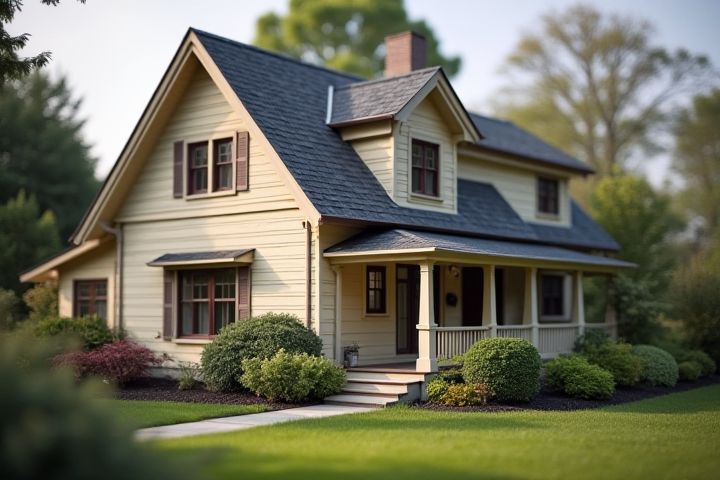
House values appreciate due to several key factors, including location, economic conditions, and property improvements. A desirable neighborhood with good schools, amenities, and low crime rates can significantly boost property values. Economic growth often leads to increased demand for housing, which can drive prices higher as more buyers enter the market. Additionally, home renovations and upgrades enhance the property's appeal and functionality, further increasing its market value. Understanding these elements can help you make informed decisions when buying or selling real estate.
Why House Values Appreciate
Economic Growth
Economic growth directly influences house values, as a robust economy often leads to increased consumer confidence and higher disposable incomes. In regions where employment rates rise, the demand for housing typically escalates, driving prices upward. Historical data shows that real estate markets in cities with annual GDP growth above 3% tend to appreciate significantly, sometimes exceeding 5% year-on-year. As you consider potential investments, understanding the relationship between local economic indicators and housing trends is essential for optimizing your returns.
Population Growth
Population growth significantly impacts house values, as an increasing number of residents often leads to heightened demand for housing. Areas experiencing population surges, especially urban centers, see a rise in home prices due to a limited supply of available properties. In the United States, for instance, cities like Austin and Phoenix have recorded population increases of over 20% in the last decade, correlating with a 30% appreciation in home values during the same period. As more people seek residence in attractive regions, the competition for homes intensifies, ultimately driving prices upward.
Employment Rates
Employment rates significantly impact house values, as a higher employment rate typically indicates a strong economy where individuals have disposable income to invest in real estate. In regions with employment growth, demand for housing often rises, leading to competitive bidding and consequently higher property prices. For instance, a city experiencing a 5% increase in jobs may see house values appreciate by 10-15% over a year. When you notice a robust job market, it's a strong indicator that investing in property could yield substantial returns.
Interest Rates
Interest rates play a critical role in the appreciation of house values, primarily through their influence on mortgage affordability. When interest rates are low, your borrowing costs decrease, allowing more buyers to enter the market and driving demand, which often leads to higher property values. Conversely, rising interest rates can dampen demand as prospective homeowners face higher monthly payments, typically resulting in a slowdown in value appreciation. According to data from the Federal Reserve, a 1% increase in interest rates can reduce home purchase ability by approximately 10%, highlighting the sensitivity of the housing market to borrowing costs.
Housing Supply and Demand
Housing values appreciate primarily due to the imbalance between housing supply and demand. When demand exceeds supply, property prices tend to rise significantly; for instance, in areas with limited housing availability, a 20% increase in demand can lead to a 10-15% appreciation in home values within a year. Conversely, if new construction fails to keep up with population growth, competition among buyers intensifies, further driving up prices. Overall, understanding local market dynamics, such as job growth and demographic trends, can help you foresee potential changes in property values.
Inflation
House values typically appreciate during periods of inflation due to the increasing cost of materials and labor, which drives up construction expenses. In 2023, the U.S. experienced an inflation rate averaging around 6%, contributing to higher home prices. As the purchasing power of money decreases, real estate becomes a more attractive investment, leading many buyers to enter the market and compete for available properties. Consequently, this heightened demand, coupled with limited housing supply, amplifies price increases, effectively making real estate a hedge against inflation.
Urban Development
Urban development significantly influences house values, with metropolitan areas experiencing an annual appreciation rate of approximately 3-5%. This growth is often driven by factors such as improved infrastructure, enhanced public transportation systems, and increased access to amenities like parks and shopping centers. As urban populations rise, demand for housing intensifies, leading to a natural increase in property values in sought-after neighborhoods. Investing in areas undergoing urban renewal can yield substantial returns, sometimes exceeding 10% per year, making it an attractive opportunity for homeowners and investors alike.
Infrastructure Improvements
Infrastructure improvements, such as new roads, public transportation systems, and enhanced utilities, significantly boost house values in a region. For example, neighborhoods that gain access to a light rail system can see property values rise by 10% or more within a few years. With better access to amenities and reduced commute times, buyers are often willing to invest more in homes located in well-connected areas. As a homeowner, you may find that your property appreciates faster in locales benefiting from sustained infrastructure investments, reinforcing its market appeal.
Government Policies
Government policies significantly influence house value appreciation through mechanisms like tax incentives, interest rate adjustments, and urban development initiatives. For instance, low mortgage interest rates, often set by the Federal Reserve, can increase demand for housing, leading to higher prices; a decrease in rates by just 1% can boost home sales by approximately 20%. Furthermore, zoning laws and infrastructure investments create desirable neighborhoods, which typically see property values increase by 10% to 25% over a few years. Understanding these policies helps you navigate the real estate market more effectively, potentially maximizing your investment returns.
Neighborhood Amenities
Neighborhood amenities significantly influence house value appreciation, often accounting for a 10-20% increase in property prices. Access to parks, schools, restaurants, and public transportation enhances the desirability of an area, attracting potential buyers and investors. Homes situated in neighborhoods with quality amenities tend to sell 30% faster than those in less desirable locations. When considering a property purchase, evaluate nearby facilities to ensure your investment yields optimal returns.
